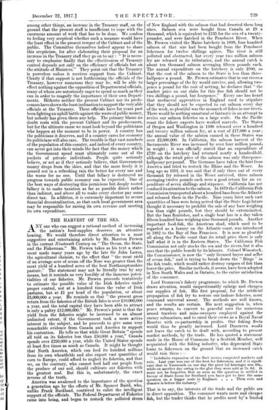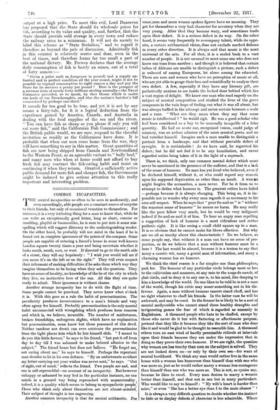THE HARVEST OF THE SEA.
ANY one who can suggest a rational method of increasing the nation's food-supplies deserves an attentive hearing. We would therefore direct attention to a most suggestive and entertaining article by Mr. Moreton Frewen in the current Nineteenth Century on " The Ocean, the State, and the Fisherman." Mr. Frewen takes as his text a state- meat made many years ago by the late Sir John Lawea, the agricultural chemist, to the effect that " the meat yield of an average acre of ocean off the Nore was greater than the meat yield of a hundred acres of the best Northamptonshire pasture." The statement may not be literally true by any insane, but it reminds us very forcibly of the immense poten- tialities of our fisheries. Mr. Frewen proceeds tentatively to estimate the possible value of the Irish fisheries under proper control, not at a hundred times the value of Irish pastures, but at £1 per head of the population, or about £5,000,000 a year. He reminds us that the present gross return from the fisheries of the British Isles is over £10,000,000 a year, and the total capital they have been able to attract is only a paltry £12,000,000." Mr. Frewen's point is that the yield from the fisheries might be increased to an almost unlimited extent, if the Government took a inore active interest in the subject, and he proceeds to give some very remarkable evidence from Canada and America to support his contention. He tells us that while Great Britain " spends all told on its fisheries less than £50,000 a year," Canada spends over £250,000 a year, while the United States spends at least five times as much as Canada. It might be thought that North America, which can feed its hundred millions from its own wheatfields and also export vast quantities of corn to Europe, could afford to neglect its fisheries, and that we, on the contrary, who cannot feed half our people from the produce of our eoil, should cultivate our fisheries with the greatest zeal. But this is, unfortunately, the exact reverse of the truth.
America was awakened to the importance of the question a generation ago by the efforts of Mr. Spencer Baird, who, unlike Frank Duckland, contrived to enlist the intelligent support of the officials. The Federal Department of Fisheries came into being, and began to restock the polluted rivers
of New England with the salmon that had deserted them long since. Salmon ova were bought from Canada at £9 a thousand, which is equivalent to £135 for the ova of a twenty- pounder, and were hatched in the Penobscot River. When Mr. Frewen visited the Maine hatchery in 1899, four hundred salmon of that size had been bought-from the Penobscot fishermen for twelve shillings apiece. The river is still polluted and obstructed, but every year two million salmon fry are released in its tributaries, and the annual catch is about ten thousand salmon averaging fifteen pounds each. The annual expenditure on the hatchery is only £800, so that the cost of the salmon to the State is less than three- halfpence a pound. Mr. Frewen estimates that in our rivers a larger percentage of the fry would survive, and, allowing two- pence a pound for the cost of netting, he declares that " the market price on our slabs for this fine fish should not be two shillings a pound, but fourpence." Every one has heard that mediaeval apprentices in England used to stipulate that they should not be expected to eat salmon every day of the week, so plentiful was the monarch of fishes in our rivers. There would be nothing unnatural or fantastic in an attempt to revive our salmon fisheries on a large scale. On the Pacific coast the fishery experts have worked marvels. The States of Oregon and Washington in • 1900 released over a hundred and twenty million salmon fry, at a cost of £17,000 a year ; the annual value of the salmon canned in these States was over £2,000,000. In California, the salmon harvest of the Sacramento River was increased by over four million pounds in weight ; it was officially stated that an expenditure of £720 on the hatchery had returned nearly a hundredfold, although the retail price of the salmon was only threepence- halfpenny per pound. The Germans have taken the hint from America and tried to restock the Rhine and the Weser. As long ago as 1901, it was said that if only three out of every thousand fry released in the Weser survived, three salmon averaging twelve pounds each were a good return for an ex- penditure of seven shillings and sixpence. California has not confined its attention to the salmon. In 1879 the California Fish Commission transported about a hundred bass from the Atlantic and released them in the Pacific. Nine years later such vast quantities of bass were being netted that the State Legislature thought it necessary to prohibit the sale of any bass weighing leas than eight pounds, lest they should be exterminated. But the bass flourishes, and a single boat has in a day taken fifteen hundred bass weighing nine thousand pounds. Another important food-fish, the American shad, which used to he regarded as a luxury on the Atlantic coast, was introduced in 1882 to the Bay of San Francisco. It is now so plentiful all along the Pacific coast that its retail price there is only half what it is in the Eastern States. The California Fish Commission not only stocks the sea and the rivers, but it also sees that the public benefit by its labours. Colonel Wine.stock, the Commissioner, is now the " only licensed buyer and seller of ocean fish," and is trying to break down the " Rings " in the fish trade, which would rather destroy cargoes of fish than lower the price. Similar methods, it seems, have been adopted in New South Wales and in Ontario, to the entire satisfaction of the consumer.
Lord Dunraven's fishery programme, to which Mr. Frewen draws attention, would unquestionably enlarge and cheapen our supplies of fish. His first proposal, for the artificial propagation of fish fry to restore our inshore fisheries, intuit command universal assent. The methods are well known, and the results are certain. His next suggestion is, when peace returns, to convert to peaceful uses the numerous armed trawlers and mine-sweepers employed against the enemy submarines, and to enrol their crews as a Royal Naval Reserve with co-partnership in profits. Our fishing fleets would thus be greatly increased. Lord Dunraven would not leave the catch to be dealt with, according to present market methods, by the trade. He has quoted a statement made in the House of Commons by a Scottish Member, well acquainted with the fishing industry, who deprecated State loans to fishermen on the ground that an increased catch would ruin them :— " Indefinite expansion of the fleet means congested markets and ruin. Last year was one of the best for fishermen. and it is signifi- cant that in Yarmouth on one day the price (of herrings) was 40a. while on another day owing to the glut they were .1,1 at 2e. 0,1. lt must not be forgotten that as soon as the question is settled in favour of State loans for Scotland you have got to face the same question on a bigger scale in England. . . . Then ruin and disaster is before the industry."
That is to say, the interests of the trade and the public are in direct opposition. The consumer wants more and cheaper fish, but the trader thinks that he profits most by' a limited output at a high price. To meet this evil, Lord Dunraven has proposed that the State should fix wholesale prices for fish, according to its value and quality, and, further, that the State should provide cold storage in every town and reduce the railway rates to a nun' imum. It will not do merely to label this scheme as " State Socialism," and to regard it therefore as beyond the pale of discussion. Admittedly fish in this country is relatively scarce and dear, even in the best of times, and therefore forms far too small a part of the national dietary. Mr. Frewen declares that the average daily consumption of fish is barely an ounce, out of a total of forty ounces :- " Given a price such as fourpenco (a pound) and a supply un- limited and in perfect condition all the year round, might it not be possible to expand consumption to eight ounces a day and pay the State for its services a penny per pound ? Here is the prospect of a revenue item of nearly forty millions sterling annually—the Naval Estimates provided, so to speak, by that Ocean which is under the keels of our Dreadnoughts, and also the nation's butcher's bill economised by perhaps one-third."
It sounds far too good to be true, and yet it is not by any means a fairy-tale, for it is a logical deduction from the experience gained by America, Canada, and Australia in dealing with the food supplies of the sea and the rivers. " You can have fish as cheap as you please if only you will eat more fish," said the Californian Fish Commissioner ; and the British public would, we are sure, respond to the cheerful invitation as readily as the Californians have done. It is probable that when our men come home from the war, they will have something to say in this matter, Great quantities of fish are now being shipped from Canada and Newfoundland to the Western Front, as an agreeable variant to " bully beef," and many men who when at home could not afford to buy fresh fish may contract the fish-eating habit and insist on continuing it when they return. Granted a sufficiently active public demand for more fish and cheaper fish, the Government might be induced to give serious attention to this really important and interesting problem.



























 Previous page
Previous page